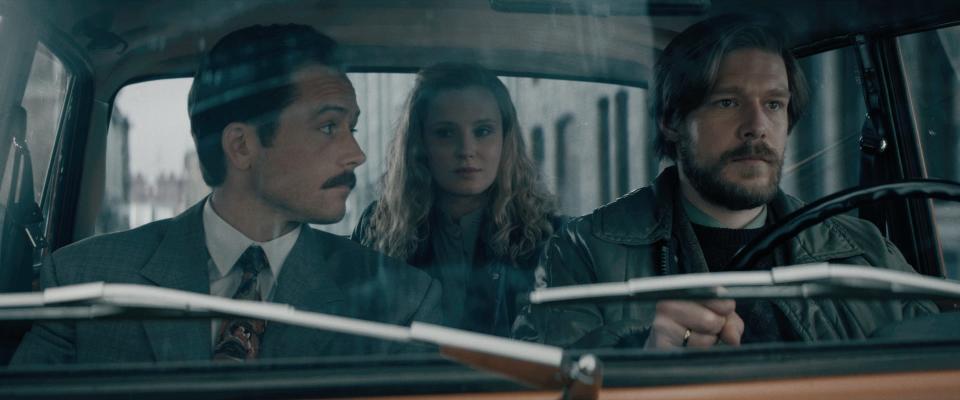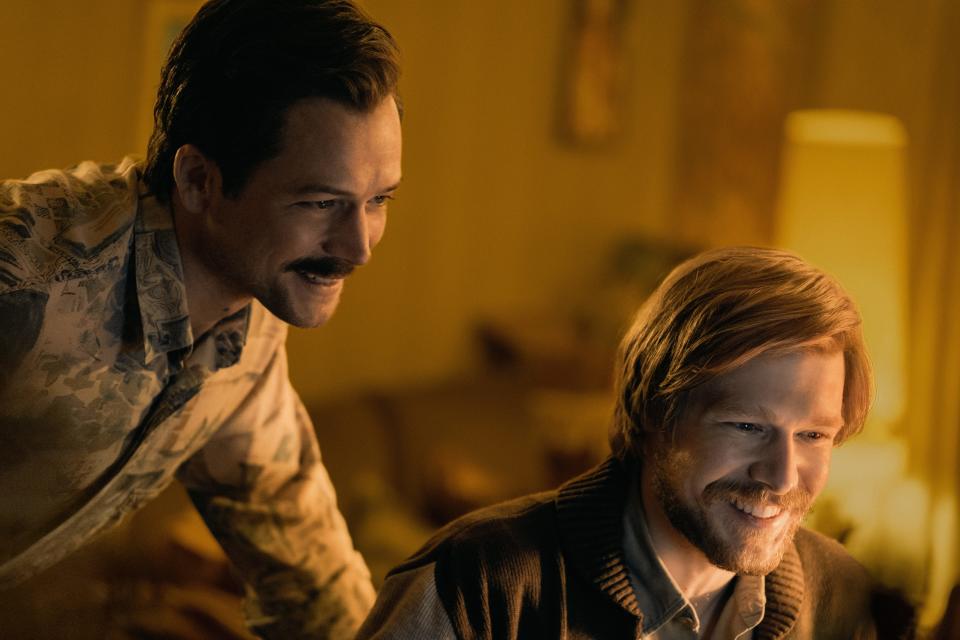Fact checking 'Tetris': Did Soviet KGB thugs really mug Henk Rogers for his Levi's?
Taron Egerton, who walked the Yellow Brick Road in Elton John's platform shoes for 2019's "Rocketman," takes on a new real-life character in the Apple TV+ drama "Tetris" (streaming Friday).
This time, it's businessman Henk Rogers, who navigated securing the rights to the falling-block video game amid 1980s Soviet Union intrigue.
In the double-cross drama, Egerton, 33, plays the plucky entrepreneur who risks everything to battle for the puzzle game created by Soviet software engineer Alexey Pajitnov (Nikita Efremov) in his spare time.
"The idea of this cowboy-ish, slightly naive but very determined man going behind the Iron Curtain to secure the game rights seemed like craziness, but that's exactly what he did," says Egerton. " And the vast majority of it is true, which is a big reason why I wanted to tell this story."
The Tetris origin story is complicated and legally fraught. "The movie brings my story to the masses and turns what took a year and a half into a two-hour drama on steroids," says Rogers.
USA TODAY spoke to the real Rogers and Pajitnov to break down what's true and what's not in the film.
Spoiler alert! In discussing the true story of Tetris, this story reveals key plot points from the movie. Stop reading until you stream it.
Was Henk Rogers at risk traveling to Russia to secure the rights to Tetris?

Dutch-born, American-raised Rogers, who ran the struggling Bullet-Proof Software in Japan, fell instantly in love while testing the little-known Tetris at Las Vegas' 1988 Consumer Electronics Show.
After seemingly securing the Japanese console rights to the addictive game, he borrowed $2 million for video game cartridge production, using his in-law's home as collateral. He discovers his life-altering agreement wouldn't be honored by the state-owned ELORG software company, starting a frenzied intellectual rights battle.
"If I hadn't sorted that out, I would not only have lost my in-laws' land but my entire business," says Rogers.
Even traveling to the Soviet Union on a tourist visa to conduct under-the-radar Tetris business, as depicted on screen, was dangerous. Rogers says the scene where his translator warns him not to enter ELORG's Moscow headquarters showed the real fear he felt on the trip.
"I didn't travel all of this way not to go through those doors," says Rogers. "My interpreter wouldn't even go inside with me."
How much spying was really happening?
"People knew exactly what I had said in past conversations. It was like, 'Why did you say this?' It was clear they were listening to me," Rogers says of his business dealings. "But they weren't just spying on me, they were spying on each other."
Rogers' beautiful Russian translator Sasha (Sofya Lebedeva) even turns out to be a KGB spy in "Tetris." While her high-level position is clearly enhanced for dramatic purposes, Pajitnov says the notion of translators working for or reporting to the KGB is very plausible.
"But basically nobody knows. The fear of spying was around us all the time," Pajitnov says.
Was Rogers beaten for his Levi's? Did he escape Russia in a car chase?
Rogers is shown getting roughed up by a KGB thug and having his Levi's blue jeans stolen off his body, forcing him to trudge through the snow to his hotel in his underwear. That never happened. Likewise, the film's climactic car escape to the airport, similar to the hair-rasing escape in the Oscar-winning spy movie "Argo," is pulp fiction.
The "Tetris" car chase with pursuing Russian spies cuts to video game-like animated segments. "That is a sign that it's a little bit exaggerated," says Pajitnov.
Did Rogers and Pajitnov become fast forever friends?

Both Rogers and Pajitnov heap praise on the real depiction of their trusting relationship amid the subterfuge. That's shown right from their first meeting at Pajitov's humble apartment.
"They reproduced that absolutely accurately, that's how I remember it," says Pajitinov.
Pajitinov didn't make a cent off the game when Tetris' popularity first spread like wildfire on floppy discs but started earning tech-mogul royalties when Rogers finally secured handheld game rights, which eventually went to Nintendo. Tetris was packed in with the revolutionary Game Boy in 1989, with more than 35 million sold.
Pajitnov moved to the United States in 1991, becoming a U.S. citizen and founding The Tetris Co. with Rogers in 1996. The two remain close friends, meeting up and traveling together through Europe, even though Pajitnov lives in Seattle and Rogers lives in New York City.
"It's been a lasting friendship," says Rogers. "Whenever we're in the same jurisdiction, we meet up for a bottle of wine. There's no business talk, just friend talk."
More on new movies:
Watch Taron Egerton: The actor reveals the story behind the 'Tetris' blocks
'Dungeons & Dragons' review: You don't need to be a fantasy gamer to revel in 'Honor Among Thieves'
Spoilers! What that jaw-dropping 'John Wick 4' ending, post-credits scene mean for Keanu Reeves
'Shazam 2': How 'Fury of the Gods' end-credit scenes set up Zachary Levi's DC future
'M3GAN': Allison Williams on the unrated scene that makes her 'sick to my stomach'
This article originally appeared on USA TODAY: 'Tetris' fact check: What's true, what's fiction in Apple TV+ movie?


